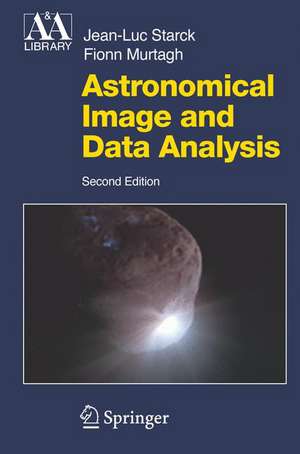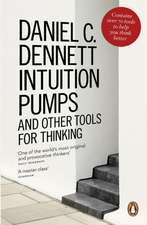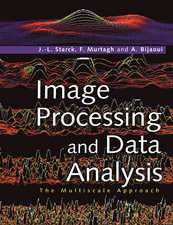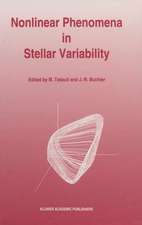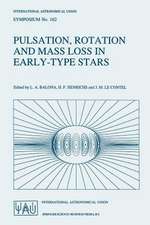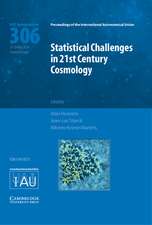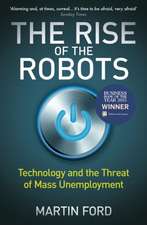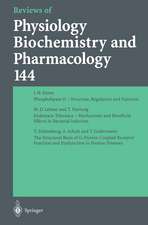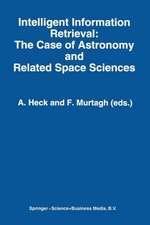Astronomical Image and Data Analysis: Astronomy and Astrophysics Library
Autor J.-L. Starck, F. Murtaghen Limba Engleză Hardback – 9 aug 2006
| Toate formatele și edițiile | Preț | Express |
|---|---|---|
| Paperback (1) | 1214.24 lei 6-8 săpt. | |
| Springer Berlin, Heidelberg – 24 sep 2014 | 1214.24 lei 6-8 săpt. | |
| Hardback (1) | 1217.72 lei 6-8 săpt. | |
| Springer Berlin, Heidelberg – 9 aug 2006 | 1217.72 lei 6-8 săpt. |
Din seria Astronomy and Astrophysics Library
- 17%
 Preț: 496.37 lei
Preț: 496.37 lei - 15%
 Preț: 603.58 lei
Preț: 603.58 lei - 19%
 Preț: 455.24 lei
Preț: 455.24 lei - 17%
 Preț: 525.72 lei
Preț: 525.72 lei - 13%
 Preț: 393.37 lei
Preț: 393.37 lei - 19%
 Preț: 524.14 lei
Preț: 524.14 lei - 17%
 Preț: 393.90 lei
Preț: 393.90 lei - 15%
 Preț: 647.40 lei
Preț: 647.40 lei - 15%
 Preț: 541.54 lei
Preț: 541.54 lei - 17%
 Preț: 362.70 lei
Preț: 362.70 lei - 18%
 Preț: 1006.55 lei
Preț: 1006.55 lei - 18%
 Preț: 745.33 lei
Preț: 745.33 lei - 15%
 Preț: 641.20 lei
Preț: 641.20 lei -
 Preț: 397.38 lei
Preț: 397.38 lei - 15%
 Preț: 598.21 lei
Preț: 598.21 lei - 15%
 Preț: 658.05 lei
Preț: 658.05 lei - 23%
 Preț: 815.07 lei
Preț: 815.07 lei -
 Preț: 409.89 lei
Preț: 409.89 lei - 15%
 Preț: 610.61 lei
Preț: 610.61 lei -
 Preț: 393.90 lei
Preț: 393.90 lei - 15%
 Preț: 655.27 lei
Preț: 655.27 lei - 18%
 Preț: 951.47 lei
Preț: 951.47 lei - 18%
 Preț: 960.42 lei
Preț: 960.42 lei - 18%
 Preț: 1397.68 lei
Preț: 1397.68 lei - 18%
 Preț: 959.98 lei
Preț: 959.98 lei - 18%
 Preț: 1012.08 lei
Preț: 1012.08 lei - 15%
 Preț: 481.03 lei
Preț: 481.03 lei - 15%
 Preț: 672.43 lei
Preț: 672.43 lei -
 Preț: 413.15 lei
Preț: 413.15 lei - 18%
 Preț: 1554.72 lei
Preț: 1554.72 lei - 18%
 Preț: 1410.63 lei
Preț: 1410.63 lei -
 Preț: 390.08 lei
Preț: 390.08 lei - 18%
 Preț: 944.99 lei
Preț: 944.99 lei - 19%
 Preț: 502.94 lei
Preț: 502.94 lei - 15%
 Preț: 654.12 lei
Preț: 654.12 lei - 24%
 Preț: 851.62 lei
Preț: 851.62 lei - 19%
 Preț: 515.32 lei
Preț: 515.32 lei - 15%
 Preț: 663.14 lei
Preț: 663.14 lei - 15%
 Preț: 656.43 lei
Preț: 656.43 lei - 18%
 Preț: 741.68 lei
Preț: 741.68 lei - 15%
 Preț: 647.40 lei
Preț: 647.40 lei -
 Preț: 388.90 lei
Preț: 388.90 lei - 15%
 Preț: 651.51 lei
Preț: 651.51 lei - 15%
 Preț: 655.27 lei
Preț: 655.27 lei -
 Preț: 347.59 lei
Preț: 347.59 lei - 18%
 Preț: 794.39 lei
Preț: 794.39 lei
Preț: 1217.72 lei
Preț vechi: 1485.03 lei
-18% Nou
Puncte Express: 1827
Preț estimativ în valută:
233.00€ • 243.28$ • 192.85£
233.00€ • 243.28$ • 192.85£
Carte tipărită la comandă
Livrare economică 05-19 aprilie
Preluare comenzi: 021 569.72.76
Specificații
ISBN-13: 9783540330240
ISBN-10: 3540330240
Pagini: 338
Ilustrații: XIV, 338 p.
Dimensiuni: 155 x 235 x 26 mm
Greutate: 0.6 kg
Ediția:2nd ed. 2006
Editura: Springer Berlin, Heidelberg
Colecția Springer
Seria Astronomy and Astrophysics Library
Locul publicării:Berlin, Heidelberg, Germany
ISBN-10: 3540330240
Pagini: 338
Ilustrații: XIV, 338 p.
Dimensiuni: 155 x 235 x 26 mm
Greutate: 0.6 kg
Ediția:2nd ed. 2006
Editura: Springer Berlin, Heidelberg
Colecția Springer
Seria Astronomy and Astrophysics Library
Locul publicării:Berlin, Heidelberg, Germany
Public țintă
ResearchCuprins
Introduction to Applications and Methods.- Filtering.- Deconvolution.- Detection.- Image Compression.- Multichannel Data.- An Entropic Tour of Astronomical Data Analysis.- Astronomical Catalog Analysis.- Multiple Resolution in Data Storage and Retrieval.- Towards the Virtual Observatory.- Appendix A: A trous Wavelet Transform.- Appendix B: Picard Iteration.- Appendix C: Wavelet Transform Using the Fourier Transform.- Appendix D: Derivative Needed for the Minimization.- Appendix E: Generalization of the Derivative Needed for Minimization.- Appendix F: Software and Related Developments.-References.- Index.
Recenzii
"This book is an authoritative and thorough account of numerous mathematical techniques used by research astronomers and I can strongly recommend it for those purposes." (C.R. Kitchin, Astronomy Now, Oct. 2003)
"The book addresses not only students and professional astronomers and astrophysicists, but also serious amateur astronomers and specialists in earth observation, medical imaging, and data mining." (Europe & Astronomy, 905, 2003)
"The phenomenal amounts of data produced by modern telescopes require powerful tools to extract whatever valuable nuggets of information they contain from the dross of unwanted signal and noise. Computer power available to reduce the data is barely sufficient to keep pace. This monograph is aimed at solving these problems by a variety of different methods. [...] The book includes a number of well-chosen illustrative examples, some based on real, and others on artificial data. It also has a substantial bibliography. However it is not a guide to the several excellent reduction packages currently available. Rather it is a thorough investigation of how astronomical images can be modelled and how the maximum information can be extracted from the noise, and for this it can be recommended." (The Observatory, 123/1174, 2003)
"The book addresses not only students and professional astronomers and astrophysicists, but also serious amateur astronomers and specialists in earth observation, medical imaging, and data mining." (Europe & Astronomy, 905, 2003)
"The phenomenal amounts of data produced by modern telescopes require powerful tools to extract whatever valuable nuggets of information they contain from the dross of unwanted signal and noise. Computer power available to reduce the data is barely sufficient to keep pace. This monograph is aimed at solving these problems by a variety of different methods. [...] The book includes a number of well-chosen illustrative examples, some based on real, and others on artificial data. It also has a substantial bibliography. However it is not a guide to the several excellent reduction packages currently available. Rather it is a thorough investigation of how astronomical images can be modelled and how the maximum information can be extracted from the noise, and for this it can be recommended." (The Observatory, 123/1174, 2003)
Textul de pe ultima copertă
With information and scale as central themes, this comprehensive survey explains how to handle real problems in astronomical data analysis using a modern arsenal of powerful techniques. It treats those innovative methods of image, signal, and data processing that are proving to be both effective and widely relevant. The authors are leaders in this rapidly developing field and draw upon decades of experience. They have been playing leading roles in international projects such as the Virtual Observatory and the Grid.
The book addresses not only students and professional astronomers and astrophysicists, but also serious amateur astronomers and specialists in earth observation, medical imaging, and data mining. The coverage includes chapters or appendices on: detection and filtering; image compression; multichannel, multiscale, and catalog data analytical methods; wavelets transforms, Picard iteration, and software tools.
This second edition of Starck and Murtagh's highly appreciated reference again deals with topics that are at or beyond the state of the art. It presents material which is more algorithmically oriented than most alternatives and broaches new areas like ridgelet and curvelet transforms. Throughout the book various additions and updates have been made.
The book addresses not only students and professional astronomers and astrophysicists, but also serious amateur astronomers and specialists in earth observation, medical imaging, and data mining. The coverage includes chapters or appendices on: detection and filtering; image compression; multichannel, multiscale, and catalog data analytical methods; wavelets transforms, Picard iteration, and software tools.
This second edition of Starck and Murtagh's highly appreciated reference again deals with topics that are at or beyond the state of the art. It presents material which is more algorithmically oriented than most alternatives and broaches new areas like ridgelet and curvelet transforms. Throughout the book various additions and updates have been made.
Caracteristici
Algorithmically oriented handbook on basic tools in Astronomical Data Analysis aimed at observing astronomers Unique especially in its treatment of wavelet analysis and can also be used for classroom work There are practically no books available on this important topic
